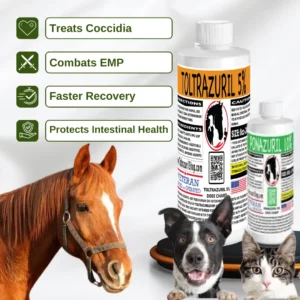-
Animal Products
Complete Toltrazuril
$4.95 – $999.95 Select options This product has multiple variants. The options may be chosen on the product pageRated 0 out of 5
Complete Toltrazuril
At Complete Toltrazuril, we are committed to providing high-quality, reliable solutions for managing animal health. Our product is designed to prevent and manage coccidiosis, a common parasitic infection that affects many animals, including cattle, poultry, goats, sheep, and companion animals. Whether you’re a farmer with a large herd or a pet owner caring for your animals, Complete Toltrazuril offers an easy and effective way to protect them from the harmful effects of coccidia.
About Complete Toltrazuril
Complete Toltrazuril is a liquid solution that contains Toltrazuril, an active ingredient known for its ability to treat and prevent coccidia infections. Coccidiosis can cause serious health problems in animals, such as diarrhea, weight loss, and in some cases, even death. Complete Toltrazuril works by stopping the coccidia parasite from reproducing, which helps your animals stay healthy and thrive.
Our product is available in different strengths (2.5%, 5%, 10%, and 20%) to meet the needs of various animals, whether they are small pets or large livestock. The liquid solution can be easily mixed with feed or water, making it simple to give to animals of all sizes.
Why Choose Complete Toltrazuril?
We understand that your animals are an important part of your life, whether you are raising livestock for production or caring for pets. That’s why we’ve developed Complete Toltrazuril with you in mind. Here are a few reasons why it’s the best choice for your animal health needs:
Effective and Reliable: Complete Toltrazuril is formulated to effectively manage and prevent coccidia infections. Its active ingredient, Toltrazuril, has been trusted for years to combat parasitic infections in animals.
Easy to Use: Administering Complete Toltrazuril is simple. You can mix it with feed or water, making it stress-free for both you and your animals.
Versatile Applications: Our product is suitable for a wide range of animals, including cattle, poultry, goats, sheep, and pets like dogs and cats. Whether you’re running a large farm or looking after a few pets, Complete Toltrazuril has you covered.
Long Shelf Life: With proper storage in a cool, dry place, Complete Toltrazuril maintains its effectiveness for a long time, ensuring that you get great value from your purchase.
Trusted Quality: Complete Toltrazuril is made under strict quality control guidelines to ensure it meets the highest standards for safety and effectiveness.
How Complete Toltrazuril Works
Coccidia are parasites that can cause serious digestive issues in animals. The parasites can spread rapidly, making it hard to control outbreaks. Complete Toltrazuril helps by targeting and stopping the life cycle of these parasites, preventing them from multiplying and spreading within the animal’s body. This helps your animals recover quickly and stay healthy.
Who Can Benefit from Complete Toltrazuril?
Farmers: Whether you’re raising cattle, poultry, goats, or sheep, Complete Toltrazuril is a vital tool to prevent and control coccidiosis in your livestock. Coccidia can lead to reduced growth rates, poor feed conversion, and higher mortality rates. By using Complete Toltrazuril, you can protect your animals and ensure the success of your farm.
Pet Owners: Pets, especially young or immunocompromised animals, can also be affected by coccidiosis. If you’re caring for dogs, cats, or other small animals, Complete Toltrazuril can help prevent coccidia infections and keep your pets healthy and happy.
Veterinarians and Animal Care Professionals: Complete Toltrazuril is an essential addition to your practice for managing coccidia in your patients. It’s easy to administer and effective for preventing and treating this common parasitic infection.
How to Use Complete Toltrazuril
Using Complete Toltrazuril is simple and convenient. The liquid solution can be mixed with the feed or water your animals consume. The dosage will vary based on the species and age of the animal, so be sure to follow the recommended instructions for best results. If you’re unsure about the correct dosage, it’s always a good idea to consult with a veterinarian.
Storage: Keep Complete Toltrazuril in a cool, dry place to ensure it stays effective for a long time.
Important: Complete Toltrazuril is for animal use only. Do not use it for human consumption or for veterinary diagnostic purposes.
A Trusted Leader in Animal Health
Complete Toltrazuril is part of our parent company, Toltrazuril Shop, which has been a trusted leader in providing reliable solutions for managing animal health for many years. We take pride in offering products that are not only effective but also safe and easy to use. Our goal is to help farmers, pet owners, and animal care professionals maintain the health and well-being of their animals through high-quality, accessible products.
Get Started Today
Protect your animals from the dangers of coccidiosis with Complete Toltrazuril. Our product is a simple, effective solution that can help improve the health of your animals, whether you’re managing a farm or caring for pets. With various concentrations available and easy-to-follow instructions, it’s the perfect addition to your animal care routine.
Order Complete Toltrazuril today and take the first step toward healthier animals and a more successful operation. If you have any questions or need assistance with your order, our friendly customer support team is here to help!
